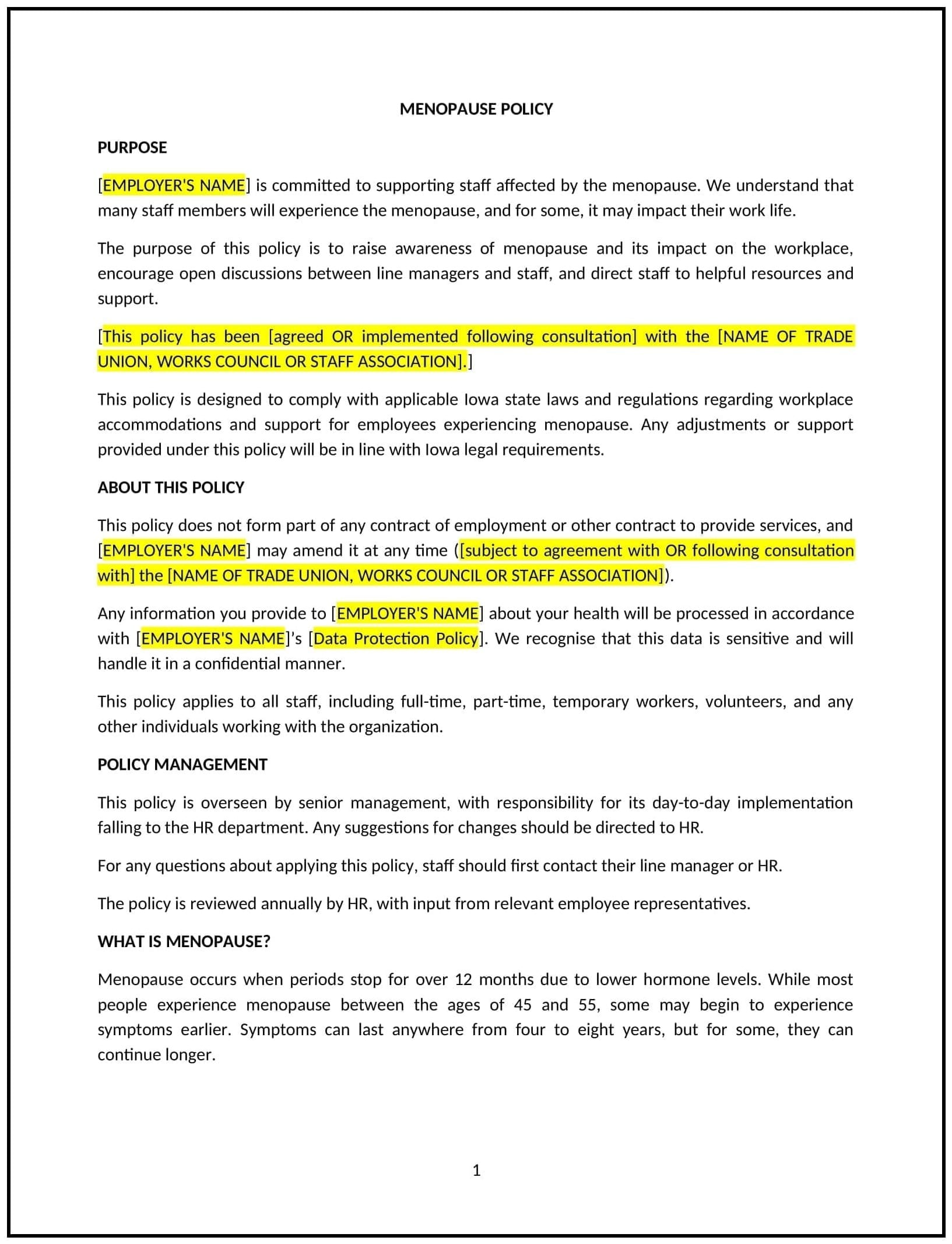Got contracts to review? While you're here for policies, let Cobrief make contract review effortless—start your free review now.

Customize this template for free
Menopause policy (Iowa)
A menopause policy helps Iowa businesses create a supportive and inclusive work environment for employees experiencing menopause. This policy provides guidelines for managing the impact of menopause symptoms on employee performance, health, and well-being. It emphasizes the importance of awareness, flexibility, and support in managing menopause-related challenges, ensuring employees feel respected and valued throughout this phase of life.
By implementing this policy, businesses can improve employee retention, create a more inclusive workplace, and provide the necessary support to employees going through menopause, ultimately fostering a healthier and more productive workforce.
How to use this menopause policy (Iowa)
- Define menopause and related symptoms: Provide a clear definition of menopause and its associated symptoms, such as hot flashes, fatigue, and mood changes, so employees understand the impact and can recognize it when it affects their performance.
- Promote awareness and sensitivity: Encourage open discussions about menopause and its effects in the workplace, aiming to reduce stigma and foster understanding among managers and colleagues.
- Offer flexible work arrangements: Provide options such as flexible hours, remote work, or breaks to help employees manage symptoms and maintain productivity.
- Provide access to health support: Offer resources such as health screenings, consultations with healthcare professionals, and information on managing menopause symptoms.
- Ensure reasonable accommodations: Make adjustments to the workplace environment, such as temperature control, private spaces for breaks, and access to restrooms, to accommodate employees experiencing menopause symptoms.
- Encourage communication: Create a supportive environment where employees feel comfortable discussing their needs and challenges related to menopause without fear of discrimination or stigma.
- Review and update regularly: Periodically assess the policy to ensure it aligns with best practices and meets the evolving needs of employees.
Benefits of using this menopause policy (Iowa)
This policy offers several key benefits for Iowa businesses:
- Fosters an inclusive work environment: By supporting employees experiencing menopause, businesses create a more inclusive culture where all employees feel valued and respected.
- Improves employee well-being: Offering flexibility and support helps employees manage menopause symptoms, leading to improved overall well-being and job satisfaction.
- Increases employee retention: Supporting employees through menopause can enhance loyalty and reduce turnover by showing that the business cares about their health and personal challenges.
- Enhances workplace productivity: By providing accommodations and flexibility, businesses can help employees maintain productivity while managing menopause symptoms.
- Reduces stigma and discrimination: This policy helps eliminate the stigma surrounding menopause, making it easier for employees to seek the help they need without fear of negative consequences.
- Strengthens employer branding: A business that actively supports employees through menopause is seen as a progressive and empathetic employer, enhancing its reputation.
Tips for using this menopause policy (Iowa)
- Educate managers and employees: Provide training on menopause awareness and sensitivity to ensure that everyone in the workplace understands the symptoms and the impact they may have.
- Encourage open dialogue: Create a safe space for employees to share their experiences and needs related to menopause, ensuring confidentiality and support.
- Provide personalized accommodations: Work with employees to identify specific accommodations that will help them manage symptoms effectively, such as flexible working hours or changes in the physical workspace.
- Maintain confidentiality: Ensure that any medical information shared by employees is kept confidential, and that accommodations are provided without disclosing personal health details to others.
- Regularly assess policy effectiveness: Gather feedback from employees on the policy’s impact and make adjustments as needed to improve support and inclusivity.
- Foster a supportive culture: Encourage all employees to be empathetic and supportive of colleagues who may be experiencing menopause symptoms, creating an overall inclusive workplace culture.